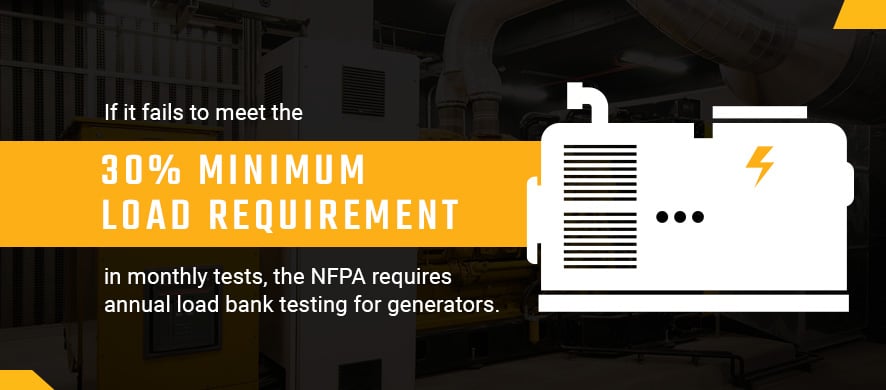Generator Maintenance Requirements According to NFPA Guidelines
Investing in a generator protects your facility from power outages and downtime. But what happens when the generator fails? A well-maintained generator can mean the difference between constant power and unexpected failures. When facilities neglect emergency generator testing requirements, they put their operation at risk.
You depend on your emergency generator during unexpected outages. When poorly maintained, emergency diesel generators only have 80% reliability at 12 hours of use. Generators must be maintained to perform reliably. That’s why the National Fire Protection Association (NFPA) developed Standard 110. The NFPA 110 outlines all the requirements for testing and maintaining generators, protecting your facility from downtime.
What Equipment Follows NFPA 110 Generator Requirements?
Emergency power supply systems (EPSS) are the main focus of NFPA 110. These standards keep backup generators ready for emergencies. Your EPSS will fit within two levels:
- Level 1: These systems are required in critical facilities. If power loss could lead to severe injury or death, like in hospitals, then you have Level 1 EPSS. They need to meet stricter testing and maintenance requirements than Level 2 equipment.
- Level 2: Level 2 covers all EPSS that are not tied to life safety. If your business will lose functions like manufacturing or telecommunications, you have Level 2 EPSS. These generators are essential for minimizing downtime, but there aren’t lives on the line.
NFPA 110 does not specifically lay out which levels need to meet which standards. That will depend on your facility and local regulations.
Generators are also classified by type and class.
Generator types tell you how soon a generator will restore power in seconds. For example, if you have a Type 60 generator, it must be able to restore power in 60 seconds.
The generator class informs users of the minimum time a generator can operate as rated without refueling. It’s measured in hours, so a Class 6 generator will supply power at its rated load for six hours. The NFPA 110 regulations cover all of these EPSS.
NFPA 110 Generator Maintenance Schedule
Regular maintenance protects your equipment from sudden failures or frequent repairs. When you follow the NFPA requirements for generators, you protect your bottom line and your facility. NFPA 110 lays out a structured maintenance schedule for your equipment, preventing failures and optimizing their performance. Let’s break down the maintenance schedule to help you stay on track:
1. Weekly Exercises
Weekly exercises ensure you’re catching issues before they become headaches. You can set your generator to run on auto for a short period of time to ensure it starts up and runs without issue. Oftentimes, generators are paired with remote annunciator panels that feed users with 16 different data points on the functionality and operational readiness of your machine. This information feed can be set to deliver information to a dedicated mechanical room or be set to remote monitoring.
Level 2 generators do not need weekly maintenance—they get checked less frequently. Here are the weekly exercises you’ll need to cover for your Level 1 generators:
- Fuel, oil, and coolant checks: These fluids should be at the levels recommended by the manufacturer’s guide.
- Visible damage: Look for visible leaks or damage around the generator. If you find any, get them repaired immediately.
- Control panel readings: Check for fault codes or abnormal readings. The system should be fault-code-free if it’s functioning correctly.
- Battery voltage: Weak or corroded connections need addressing before they can cause startup failures.
2. Monthly Testing
The NFPA 110 emergency generator maintenance requirements also include monthly testing under load. Level 1 generator monthly load tests involve:
- Running the generator: Run the generator for at least 30 minutes at 30% or more of its rated load to burn off carbon buildup and prevent engine wet stacking.
- Verifying transfer switch operation: Ensure that the system can smoothly switch to backup power.
- Checking the system: Watch the system for unusual vibrations, exhaust issues, or noises, which could mean you have a mechanical problem.
For Level 2 generators, monthly checks include:
- Load testing
- Fuel levels in the main tank and flexible hoses
- Oil levels
- Cooling system levels
- Exhaust system condition
- Battery system condition
- Electrical system condition
- Generator brush length
3. Semiannual and Annual Tasks
Some maintenance tasks need to be performed every six months to one year. Semi-regular tasks protect the long-term life of your generator. Make sure to check these systems on your Level 1 generator:
- Analyze fluids: Take fuel and oil samples. Have them analyzed for contamination or degradation.
- Perform load bank testing: If your generator is not meeting monthly load requirements, you’ll need to perform load bank testing.
- Inspect the cooling system: Look at the cooling system for leaks, blockages, or corrosion. Address these problems if you find any.
- Examine the entire system: Perform a comprehensive system inspection annually to assess the overall generator condition.
For Level 2 generators, here are the semiannual and annual tasks:
- Fuel system: Test the day float tank switch and clean any water from the system. Check and clean tank vents and piping system.
- Cooling system: Test the antifreeze protection level. Inspect the fan and alternator belt and the water pumps.
- Exhaust system: Test for excessive back pressure. Inspect exhaust system supports.
- Battery system: Check the terminal condition.
- Electrical system: Test safeties and alarms. Calibrate voltage-sensing relays and clean any boxes and panels.
- Prime Mover: Clean the service air cleaner and the ignition system. Test the injector pump and the injection system.
4. Annual Load Bank Testing
If you’re testing your generator monthly, it should pass annual load testing. If it fails to meet the 30% minimum load requirement in monthly tests, the NFPA requires annual load bank testing for generators. You’ll have to run the generator at full-rated load to ensure it can handle power demands. This process also helps you find performance issues that could be affecting the generator.

5. Fuel System Maintenance
Diesel fuel can degrade over time, especially when exposed to moisture. If your diesel becomes too degraded or contaminated, it can clog filters and cause injector issues. Make sure you’re testing the fuel annually. Additionally, invest in water and contaminant removal to prevent microbial growth in the system.
The Importance of Documentation
Documentation is key to NFPA compliance. Your emergency power systems might see audits and inspections occasionally. These check your generator for safety and performance. If you cannot prove you’re following NFPA 110 requirements, your facility could face liability issues. Keep detailed maintenance records for inspections, testing, and repairs to demonstrate your compliance during regulatory reviews.
Documentation also helps your team identify trends in generator issues. If there are common warning signs before the generator fails, managers will be able to see them in the documentation. You can stop the generator from going down, saving on repairs and downtime.
Common Compliance Mistakes to Avoid
With so many NFPA 110 generator testing requirements to follow, it’s easy to make mistakes. Use checklists and thorough documentation to keep your generator maintenance on track. Here are some of the most common testing mistakes and how to avoid them:
- Inadequate testing load: It’s easy to overlook testing generators under the required load. Make sure you’re testing generators according to NFPA 110 standards and complete annual load bank testing as needed. If you skip this step, your system may fail during an outage.
- Fuel system neglect: Diesel fuel needs to be contamination-free to perform effectively. Over time, degradation and contamination can reduce generator reliability. Treat and test fuel to keep your generator efficient and reliable.
- Battery failure: A dead or weak battery will mean your generator cannot start. As batteries age, you might see corroded terminals and low voltage. Routinely check voltage levels and replace batteries as recommended to keep your generators reliable.
Stay NFPA 110 Compliant With Woodstock Power

NFPA compliance starts with a quality generator. Whether you need a primary power source or a backup system, Woodstock Power has you covered. Our high-quality used backup generators meet the highest emissions standards and deliver reliable performance to your facility.
Our industry experts focus on commercial generator sets, with in-depth industry knowledge to help you choose the right generator that fits your needs.
Headquartered in Philadelphia, PA, and operating nationwide, we carry only top-rated new, used and surplus power generator sets for sale, providing you with a great value generator that will fit your budget.
The Woodstock Power Company Experience
We have industry experts who focus on commercial generator sets, with in-depth industry knowledge to help you choose the right generator that fits your needs. We are experts in providing generators for data center backup power needs, as well as data center decommissioning services.
We are industry leaders in buying and selling used generators to fit the needs of many businesses, including commercial, industrial, medical, agricultural, and university. This includes facilities like hospitals, better living centers, nursing homes, airports, hotels, resorts, restaurants, retail centers, manufacturing, production, and more.
Our experts are ready to assist you in answering any questions you may have about power generator sets to help you find the best selection in our inventory based on:
- Peak & Average Power Requirements
- Fuel Preference (Natural Gas or Diesel)
- Portability & Stationary Power
- Prime & Standby Generator Requirements
- Available Space & Exhaust Restrictions
Our generators have been thoroughly inspected, serviced, and verified, ensuring you buy a quality generator that you can depend on. If a generator is not up to par with industry standards, we make all necessary repairs or modifications and fully test every generator before we sell. Our process ensures a full turnkey generator that’s ready to fire up and go!
Due to our wide selection of generator sets, we’re confident we can find the model that best suits your operational needs and budget.
We also buy used generators in good quality, if you have already upgraded and you’re looking to sell your older model.
Feel free to contact us with any questions, concerns, or inquiries to learn more about the Woodstock Power Company experience and the quality level of products and services we provide.
Follow us on LinkedIn, YouTube, Facebook, and Twitter for more info about commercial generators!

